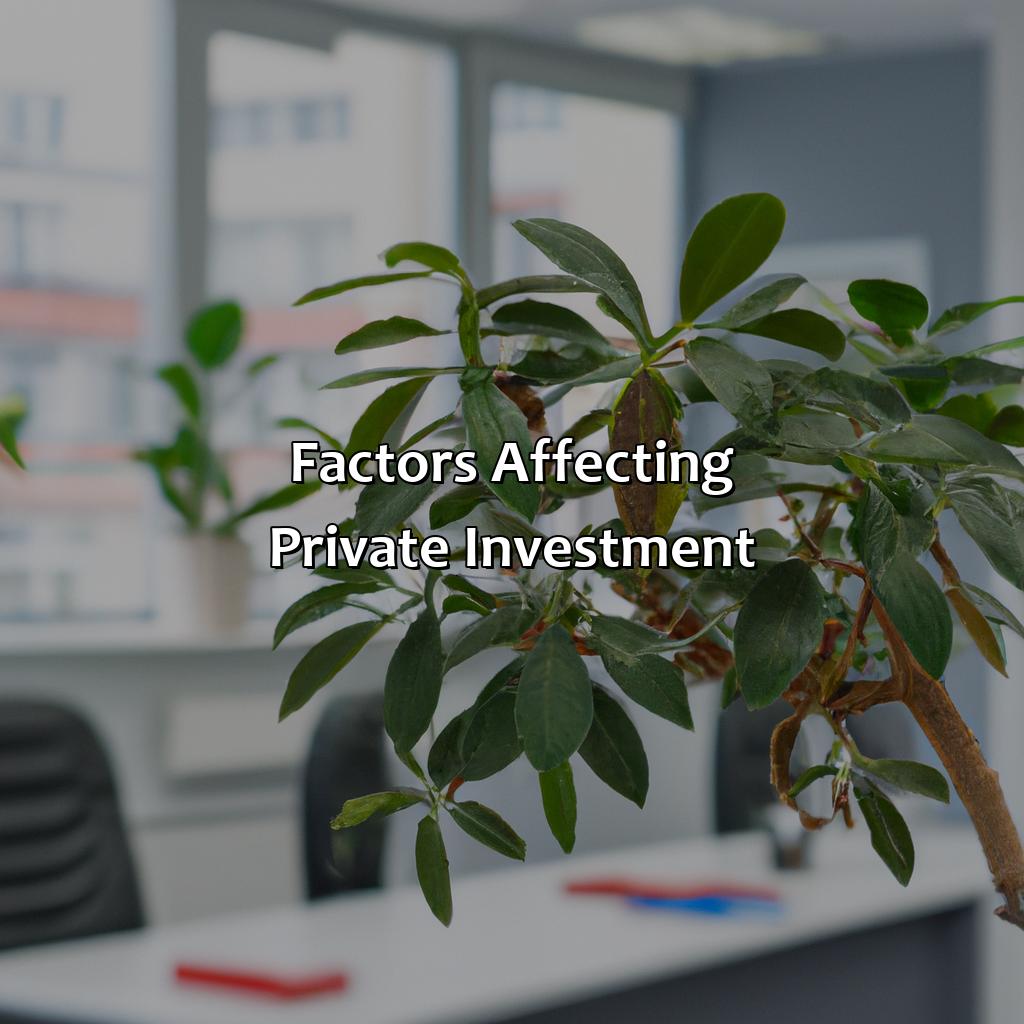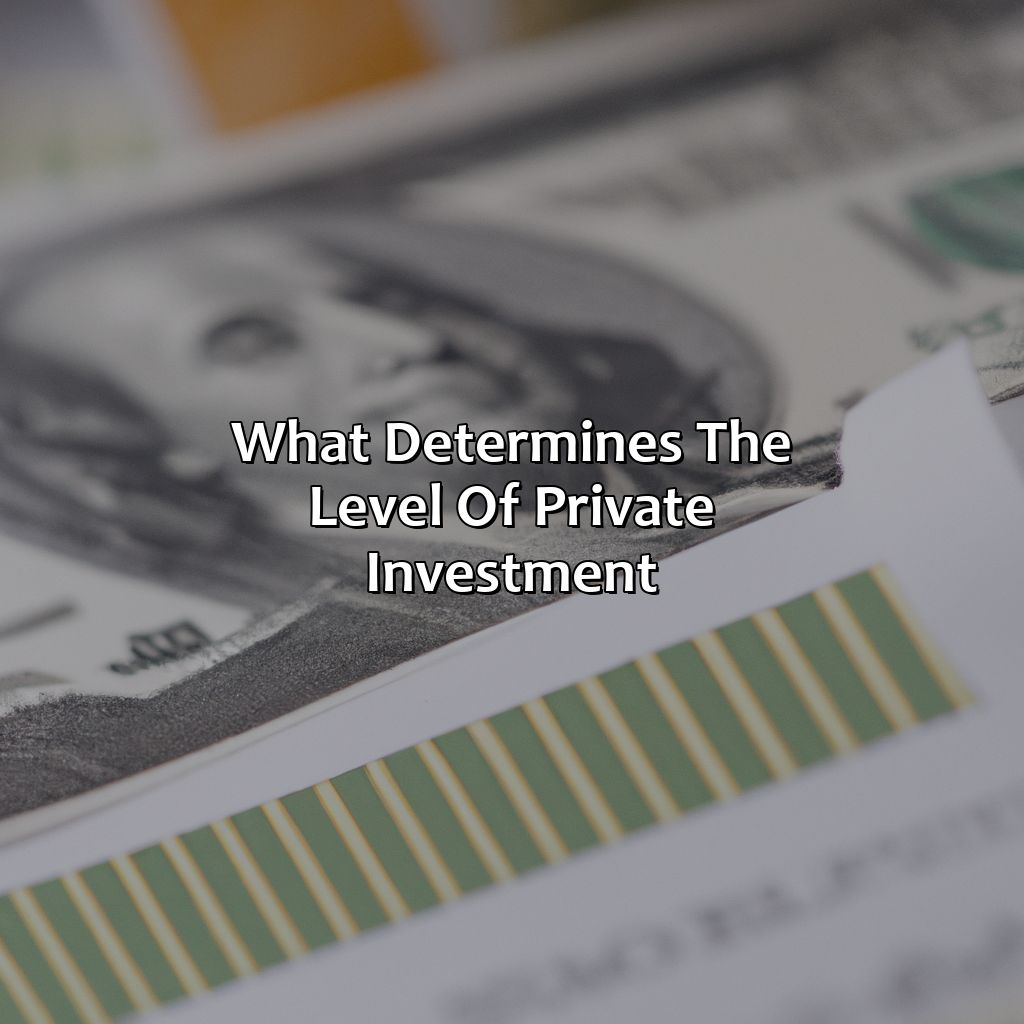What Determines The Level Of Private Investment?
Key Takeaway:
- The level of private investment is influenced by various factors, including the macroeconomic environment, government policies, business environment, and investor sentiment.
- The macroeconomic factors that influence private investment include interest rates, inflation rates, and exchange rates. These factors affect the cost of capital and can impact investment decisions by businesses and individuals.
- Government policies, such as fiscal and monetary policies, as well as investment regulations, can also affect private investment decisions. For example, tax incentives may encourage investment, while restrictive regulations may deter it.
- The business environment, including the legal framework, infrastructure, and market size, also plays a role in determining the level of private investment. A favorable business environment can attract investment, while an unfavorable one may discourage it.
- Investor sentiment, including confidence and risk perception, also impacts private investment decisions. A positive outlook on the economy and investment opportunities may increase investment, while a negative outlook may decrease it.
Are you worried about where private investments should be focused? This article helps you understand the factors which influence the level of private investments and how to make the best decisions. You can learn how to leverage these insights to maximize returns.
Factors affecting private investment
Private investment is influenced by a variety of factors that can be categorized into internal and external factors.
Internal factors include the firm’s financial position, production capacity, and management skills. External factors consist of market conditions, political stability, and legal and regulatory environment.
Furthermore, macroeconomic variables like interest rates, inflation, and exchange rates also affect private investment.
A robust investment climate, investor protection, and development of financial markets tend to attract private investment. Therefore, the level of private investment is subject to many factors that affect the economic environment in which firms operate.
Private investment is a crucial driver for economic growth as it stimulates production and creates employment opportunities.
Incentivizing private investment requires addressing factors that hamper investment climate and investor confidence. These factors include political instability, corruption, lack of infrastructure and skilled labor, excessive bureaucracy, and inadequate access to finance.
Encouraging private investment requires building trust and providing supportive policies that offer a stable business environment. Governments can also promote investment by developing infrastructure, providing investment incentives, and creating tax-friendly policies that spur private investment.
Interestingly, in sub-Saharan Africa, private investments in agriculture turn out to be much more successful than public investments, according to a new study. The study suggested that private investment in agriculture creates more value than public investment, indicating the confidence of investors in the future of African agriculture. Private investors large and small in African agriculture benefit from access to finance, business skills, and networking provided by public-private organizations. Therefore, policies focused on unlocking private investment in African agriculture can have a significant impact on economic growth and food security in the region.
In Nigeria, a country that faces challenges attracting investments due to high levels of insecurity and corruption, investors have created unique ways to navigate these challenges. For instance, foreign investors have established Joint Ventures with Nigerian companies, enabling them to access local knowledge while mitigating the risks associated with investing in a foreign market. Such partnerships demonstrate the importance of collaboration and building trust between investors and the local community to unlock private investment.

Image credits: retiregenz.com by Yuval Arnold
Macroeconomic environment
Let’s explore how interest rates, inflation, and exchange rates can influence private investment. These factors can have a big effect on the decisions businesses make.
Dive deep to better understand what determines the level of private investment in a macroeconomic environment.

Image credits: retiregenz.com by David Duncun
Interest rates
The role of monetary policy is pivotal in shaping the economic environment. Central banks have the authority to set interest rates that can influence private investment as it offers better returns. Lower interest rates reduce borrowing costs and increase disposable income, leading to higher demand for goods and services, which boosts private investment. Conversely, high-interest rates restrict innovation and expansion since firms prefer saving to investing, thus discouraging growth.
Inflation dynamics play a significant role in determining interest rates. A high inflation rate demands higher interest rates as it reduces purchasing power, limiting investments. Furthermore, national debt levels impact monetary policy decisions as governments seek to finance deficits through borrowing raising public debt levels challenges fiscal-policy makers.
Interest rate changes often create market volatility which impacts investments in various asset classes & commodities creating opportunities for those with an ability to read trends and execute on them faster than others may benefit from higher returns on their investments.
Don’t miss out on opportunities due to lack of awareness about macroeconomic events and factors influencing private investment decisions. Stay informed via trusted sources such as financial publications or consult with reputable financial advisors.
Looks like inflation rates are like the Kardashians, they just won’t stop growing.
Inflation rate
The impact of the rising prices of goods and services on private investment, also known as the purchasing power of money, is a crucial factor in determining investment levels. Inflation erodes the value of currency, causing uncertainty and affecting the confidence of investors.
Inflation can lead to higher interest rates, making borrowing costly for businesses. This increase in borrowing costs can lead to reduced investments in capital expenditures and research and development projects. Additionally, inflation causes higher costs in production expenses such as wages, raw materials and transport costs, reducing profit margins of companies.
It’s essential for policymakers to maintain inflation at a stable rate to prevent it from adversely affecting investment growth rates. Failure to control inflation creates an economically unstable atmosphere that deters investors, hampering economic growth.
Investors must monitor inflationary trends closely since high inflation impacts not only short-term but long-term portfolio returns as well. Ensuring inflation stays at an acceptable level is critical for companies looking to maximize their profits while attracting more private investment into the marketplace.
Exchange rates may fluctuate, but my investment in dad jokes remains constant.
Exchange rate
The impact of foreign currency exchange rates on private investment can be significant. This variation in exchange rates between currencies can lead to changes in the cost and revenue streams for businesses operating internationally, impacting their investment decisions.
Below is a table showcasing the Exchange rate data of USD to EUR over the past five years from 2017 to 2021:
| Year | Exchange Rate (USD to EUR) |
|---|---|
| 2017 | 0.9406 |
| 2018 | 0.8369 |
| 2019 | 0.8924 |
| 2020 | 0.8535 |
| 2021 (till June) | 0.8248 |
It is important to note that fluctuations in exchange rates cannot be predicted with certainty, making it challenging for businesses to plan investments in the macroeconomic environment.
While exchange rates are a crucial determinant of private investment levels, other external factors such as political stability, economic policies, and industry-specific trends also play significant roles.
Pro Tip: When investing internationally, it is essential to consider both the current and forecasted exchange rates to mitigate any risks associated with sudden fluctuations in currency values.
Government policies are like a box of chocolates – you never know what you’re gonna get, but you sure hope it’s not a tax hike.
Government policies
This section concentrates on three main areas to comprehend the effect of government policies on private investment. These are: fiscal policies, monetary policies, and investment regulations. Examining them each separately can give a thorough understanding of how government policies can either encourage or impede private investment.

Image credits: retiregenz.com by Adam Washington
Fiscal policies
One of the critical determinants for private investment is the implementation of government policies that regulate the economy, also referred to as economic policies. Fiscal policies are one of these critical economic policies which include regulations and taxation that affect public spending. This policy affects how much money individuals and companies have and can influence their investment decisions.
Fiscal policies aimed at stimulating economic growth will usually benefit private investors because it creates more opportunities in the market, making it easier for them to invest in profitable ventures. For example, if a government implements tax breaks intended to encourage businesses or reduce corporation tax rates on profits invested in specific industries, private investors will have more resources to invest in new ventures that could expand into those industries.
Another factor affecting fiscal policy’s impact on private investment is how well targeted they are towards forming a favorable business climate conducive to sustainable development. It involves understanding specific needs within different sectors and targeting incentives and reforms accordingly to optimize private investment opportunities.
When former President George W Bush approved fiscal policy after 9/11 terrorist attack aimed at boosting The U.S economy, implementing the Jobs Growth Tax Relief Reconciliation Act (JGTRRA). Much-needed deductions and removals of current taxes from employment during this period had helped a lot of Companies back to action after such horrific events.
Monetary policies are like a game of Jenga, one wrong move and the whole economy comes crashing down.
Monetary policies
The policies implemented by the government to regulate and control the amount of money in circulation are known as Monetary policies. These policies aim to achieve price stability, promote economic growth, and reduce unemployment rates by controlling interest rates, money supply, and inflation levels. By managing the supply of money in an economy, monetary policy can impact the level of private investment in a country.
Monetary policy influences economic activities through changes in interest rates. When a central bank lowers interest rates, it makes loans more accessible and cheaper. This leads to an increase in borrowing by businesses, which results in increased investments. In contrast, when interest rates are high, borrowing becomes expensive, leading to reduced investments.
Moreover, other monetary policy tools such as reserve requirements and open market operations can affect the money supply and its availability for lending following changes in interest rates. Therefore, by using specific instruments within monetary policy frameworks creatively alongside fiscal policies governements can influence private investment.
In today’s increasingly competitive business world obtaining financing is crucial for promoting innovation and improving productivity. Not adapting one’s economy with these financial tools will lag behind global standards leaving countries grappling with further shortfalls amid global downturns.
A government’s investment regulations: the fine line between hindering economic growth and hindering economic collapse.
Investment regulations
The rules and regulations formulated by governments regarding investments can greatly influence the level of private investment in a country. Such policies can either promote or hinder investments, depending on their nature and implementation.
For instance, tax incentives provided to investors by the government can encourage them to channel more capital into the economy, leading to increased investment rates. Conversely, strict regulations and high tax rates can discourage investors, reducing investment flows.
Furthermore, the stability of a country’s political environment also plays a role in determining the level of private investment within its borders. Some investors may be hesitant about investing heavily in countries with unstable political climates as it could result in loss of investments if regime changes occur.
It is reported that recent policy reforms and infrastructure development have made India one of the top destinations for foreign investors over the past decade.
“Running a business is like playing a game of chess, except the government keeps changing the rules halfway through.”
Business environment
To grasp the main forces behind private investment, examine the business environment section. Especially the legal framework, infrastructure, and market size subsections. These three parts are essential for creating the business atmosphere and impacting investment choices.

Image credits: retiregenz.com by James Jones
Legal framework
The legal structure of a country impacts the level of private investment significantly. Laws and regulations related to business ownership, intellectual property rights, contracts, and labor laws play a crucial role in shaping investment decisions. Investors tend to favor countries that provide a stable and transparent legal environment that is conducive to business operations.
Additionally, issues such as corruption levels, enforcement mechanisms, and the efficiency of court systems also impact private investment. A weak legal framework can discourage investors from investing in a country due to concerns about potential legal disputes or unfavorable regulatory environments.
It is essential for government bodies to enact appropriate laws that enhance the investment atmosphere of the country. Other factors like political stability and economic growth should be considered when crafting such policies. Neglecting these areas would lead to discouraging trends such as decreased foreign investment and capital flight.
Private investors look out for favorable conditions that align with their interests, including safety assurance in legal matters. The fear of missing out pushes them towards countries that have stable and transparent legal frameworks; thus, governments need to prioritize this sector if they want foreign investments flooding into their territories.
Good infrastructure is like a squeeze of lime in a cocktail- makes everything better and encourages more investment.
Infrastructure
The availability and quality of physical assets necessary for economic activity play a crucial role in private investment. Physical infrastructure, such as transportation, energy, and communication networks, affect the ease of doing business and directly influence investment decisions. Developed infrastructure attracts more investments as it reduces production costs and enhances connectivity.
Furthermore, countries with reliable power generation facilities, stable water supply systems, efficient transport routes, and good communication networks attract higher levels of private investment. For instance, China invested $327 billion in their infrastructure development from 2016 to 2020, leading to increased foreign investment.
Investors assess a country’s infrastructure condition before investing their money in developmental projects. In doing so, they seek assurance that their investments will yield suitable returns. Hence governments worldwide are dedicating focus towards infrastructural development to create an enabling environment for investors.
Research by the International Monetary Fund concludes that proper infrastructure constitutes up to half of variations in productivity between developed and emerging economies.
When it comes to market size, bigger is usually better unless you’re trying to find a parking spot at the mall during the holidays.
Market size
The extent of the available market is a key factor in determining the level of private investment. Expansion in the market size can elicit an increase in investment activity due to the potential for growth and profit.
A table could visualize the relationship between market size and private investment. The columns would include market size, level of private investment, and potential profit. For instance, a larger demographic means a higher market volume which implies more investment opportunities and higher chances of financial reward.
Undoubtedly, an increase in market demand serves as a stimulus for business startups/dynamics. Market size essentially acts as a catalyst that shapes the attitude of entrepreneurs towards investing their capital resources into viable business ventures.
In history, various economies have experienced unprecedented boosts solely because of sheer numbers within its markets. Emerging markets such as China have realized significant growth over time attributed partly to its growing consumer base (population). In contrast, several small-scaled businesses thrive better where there are fewer companies serving similar niches; hence competition is less intense.
Investment tip: If you want to know the investor sentiment, just listen for the sound of champagne bottles popping or the sound of keyboards smashing in a panic sell-off.
Investor sentiment
To dig deep into investor sentiment and its effects on private investment, look at confidence and risk perception. These two factors can either inspire or put off someone’s investment choices. It’s important to learn how they work, as it can help us predict and study investment trends, and make wise decisions in the private sector.

Image credits: retiregenz.com by James Duncun
Confidence
Investor sentiment plays a crucial role in private investment. The level of confidence investors have in the market determines whether they invest or not. Factors such as economic stability, political climate, and industry trends can impact investor confidence. Moreover, an optimistic outlook on future profitability and returns can also boost investor sentiment. Conversely, negative news or events can cause investors to lose faith in the market, resulting in a decline in private investment.
The level of confidence also influences the investment decision-making process. A high level of confidence may result in riskier investments with potentially higher returns while low investor sentiment may result in more conservative investment decisions.
A true history that exemplifies the role of confidence is during the 2008 financial crisis where low investor sentiment caused a decrease in private investment, leading to a recession. Conversely, during times of economic growth and stability, high levels of confidence have resulted in increased private investment and job creation.
When it comes to investing, risk perception is like playing a game of whack-a-mole – the risks keep popping up and it’s hard to keep them all down.
Risk perception
Investor’s perception of risk is a crucial determinant in the level of private investment. The risk-perception quotient involves factors such as uncertainty about future returns, volatility in markets, regulatory challenges, and operational risks. Investors gauge risk through various methods like historical data analysis and scenario-based stress testing to determine their willingness to invest.
Private investors’ perception of risk affects their investment appetite, which may either increase or decrease. A high-risk appetite investor will be more willing to invest than a low-risk appetite investor since the latter may have fear of losing capital. Economies with lower perceived political risks top up investors for higher currency fluctuations.
Meanwhile, other factors also affect investors concerning its impact on mitigating or amplifying risk perceptions. These include an education system that can contribute to creating job creation rates enhance public welfare elevation, economic liberalization policies enacted by governments.
A true story example would involve how pandemics induce changes in investors’ perceptions of risk; during COVID-19, many Private Equity firms pulled out resources from high-risk investments like travel and leisure businesses and deployed it into more stable sectors instead such as tech and healthcare startups.
Five Facts About What Determines the Level of Private Investment:
- ✅ Interest rates affect the level of private investment, as higher interest rates increase the cost of borrowing and decrease investment spending. (Source: Investopedia)
- ✅ Economic growth is a key determinant of private investment, as stronger growth prospects lead to increased confidence and higher levels of investment. (Source: The Balance)
- ✅ Government policies and regulations can influence the level of private investment, by creating either favorable or unfavorable investment climates. (Source: Council on Foreign Relations)
- ✅ Availability of credit and access to financing impact private investment, as businesses require sufficient funding to undertake investment projects. (Source: World Bank Group)
- ✅ Technological advancements can increase private investment, as companies invest in new technologies to enhance productivity and remain competitive. (Source: Harvard Business Review)
FAQs about What Determines The Level Of Private Investment?
What is private investment and what determines its level?
Private investment is the money invested by corporations or individuals into businesses, infrastructure, or other ventures for the purpose of generating profit. The level of private investment is determined by a range of factors, including economic conditions, government policies, investor confidence, and the availability of financing.
How does economic conditions affect private investment?
Economic conditions, such as interest rates, inflation, and economic growth, can have a significant impact on private investment. When interest rates are low, investors are more likely to borrow money to invest in businesses or infrastructure projects. Conversely, when inflation is high or the economy is in recession, private investment may decline as investors become more risk-averse.
What role do government policies play in determining private investment?
Government policies, such as tax incentives, regulations, and subsidies, can impact private investment. For example, tax credits or deductions for certain types of investments can encourage private investment, while strict regulations or uncertainty about future policies may discourage private investment.
How does investor confidence affect private investment?
Investor confidence is an important factor in determining the level of private investment. When investors are confident in the economy and the businesses they are investing in, they are more likely to put their money into those ventures. On the other hand, if investors are uncertain about the future or lack confidence in the businesses they are investing in, private investment may decline.
Why is the availability of financing important for private investment?
The availability of financing, such as loans from banks or investors, can impact private investment. When financing is readily available and accessible, businesses and investors are more likely to invest in new projects or ventures. However, if financing is difficult to obtain or unaffordable, private investment may be constrained.
What are some examples of factors that may affect the level of private investment?
Some additional factors that may impact private investment include technological advancements, political instability, demographics, and social trends. For example, the rise of renewable energy may encourage private investment in alternative energy sources, while political instability in a certain region may discourage investment in businesses located there.
